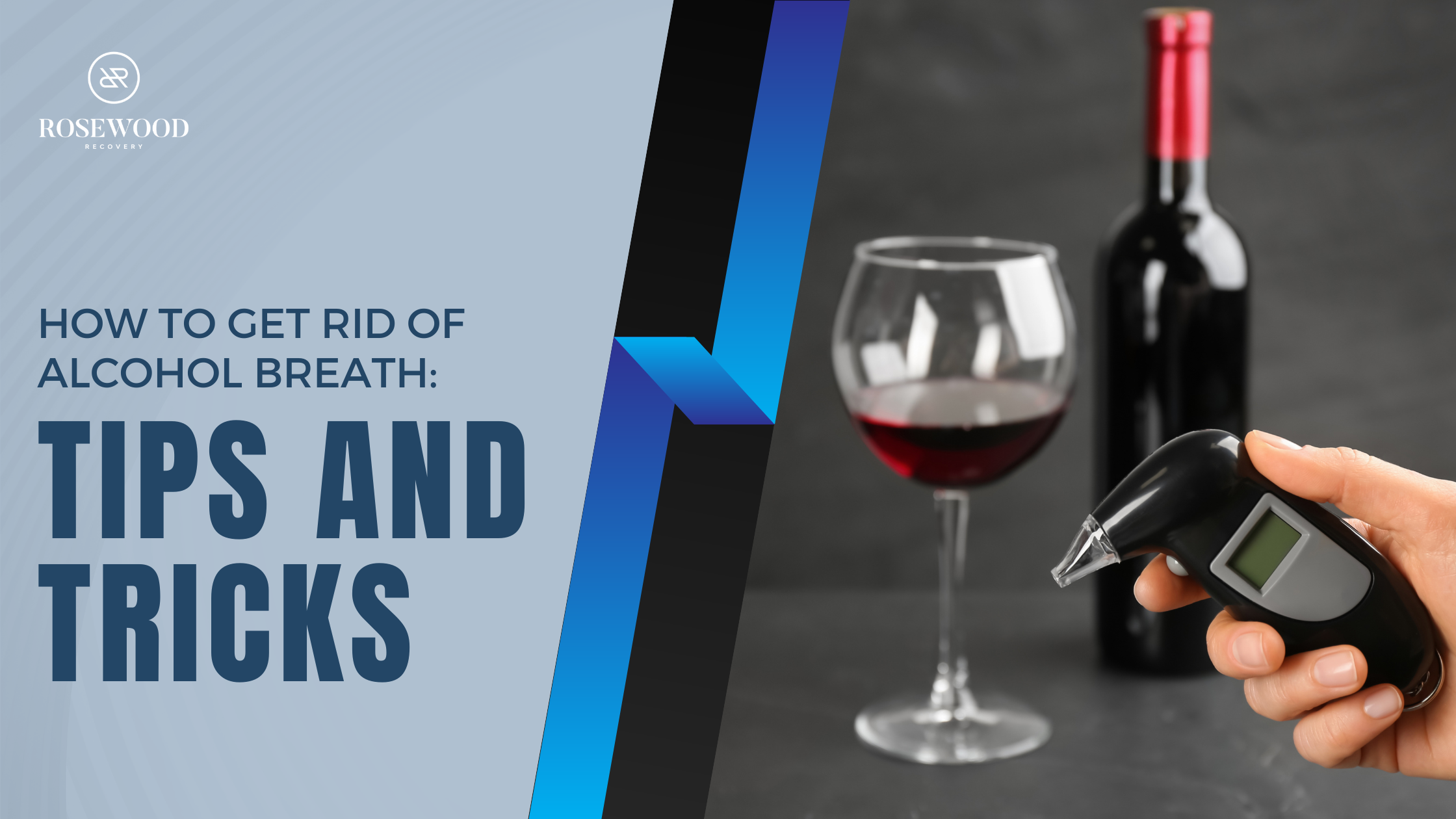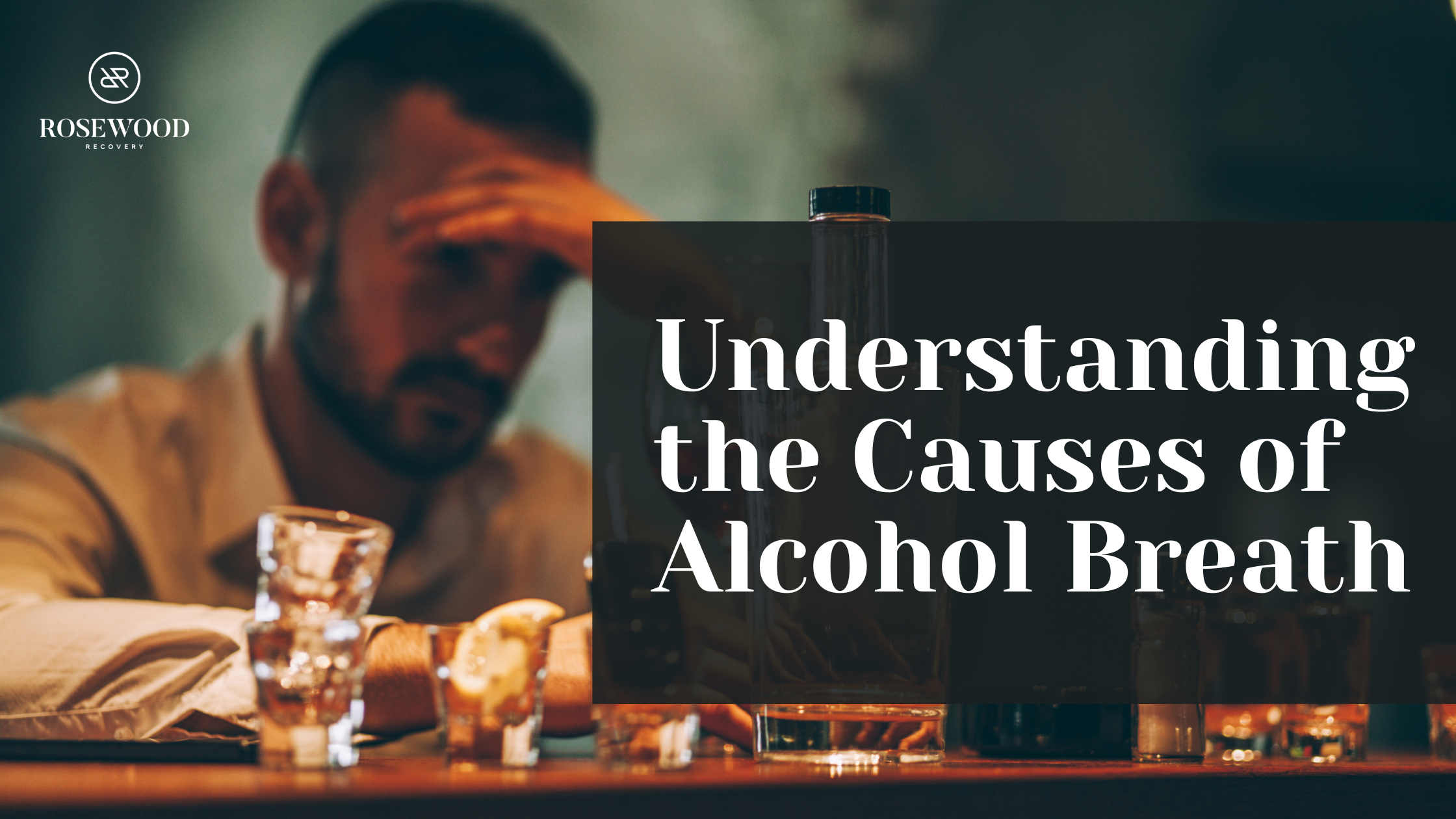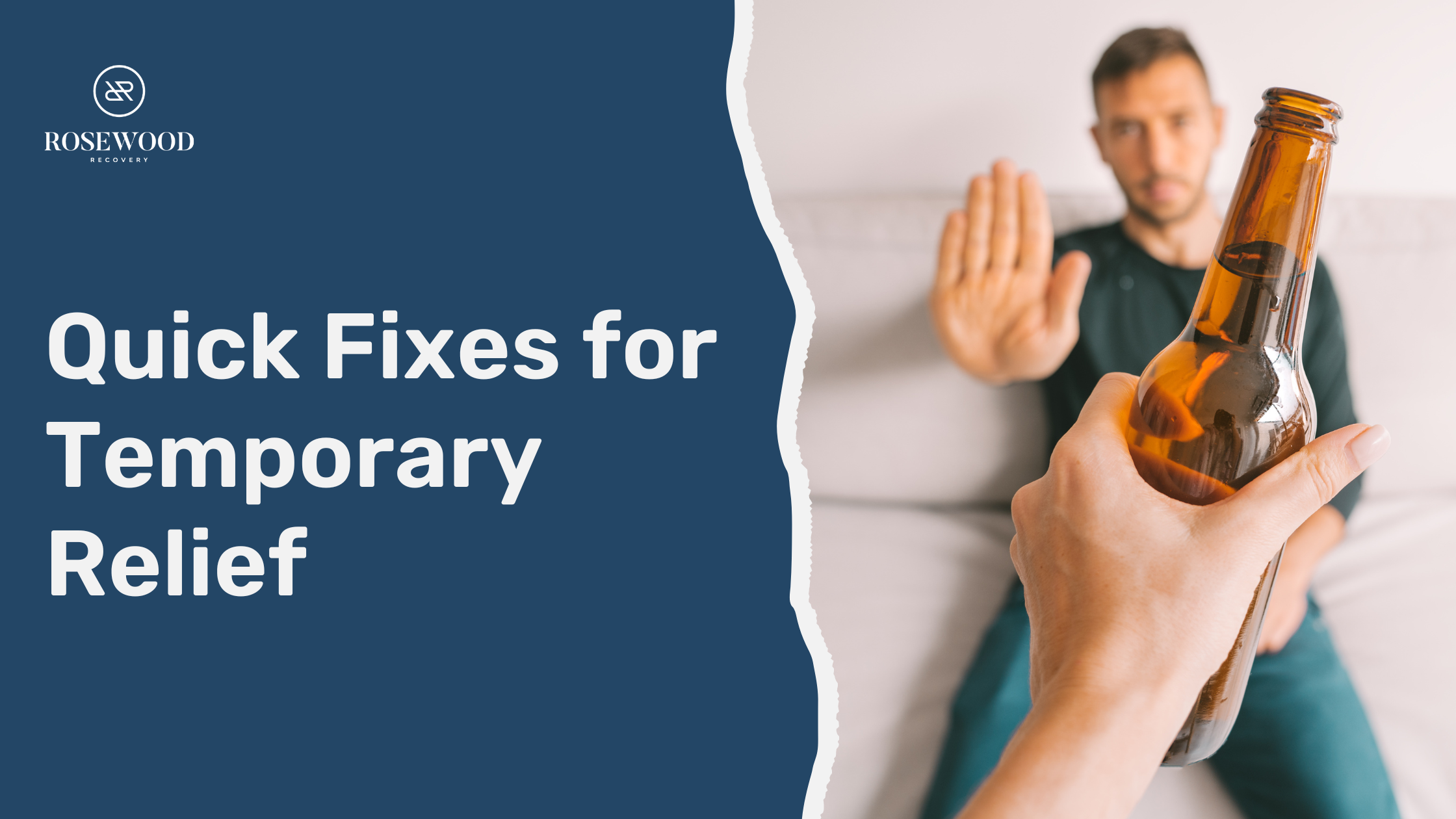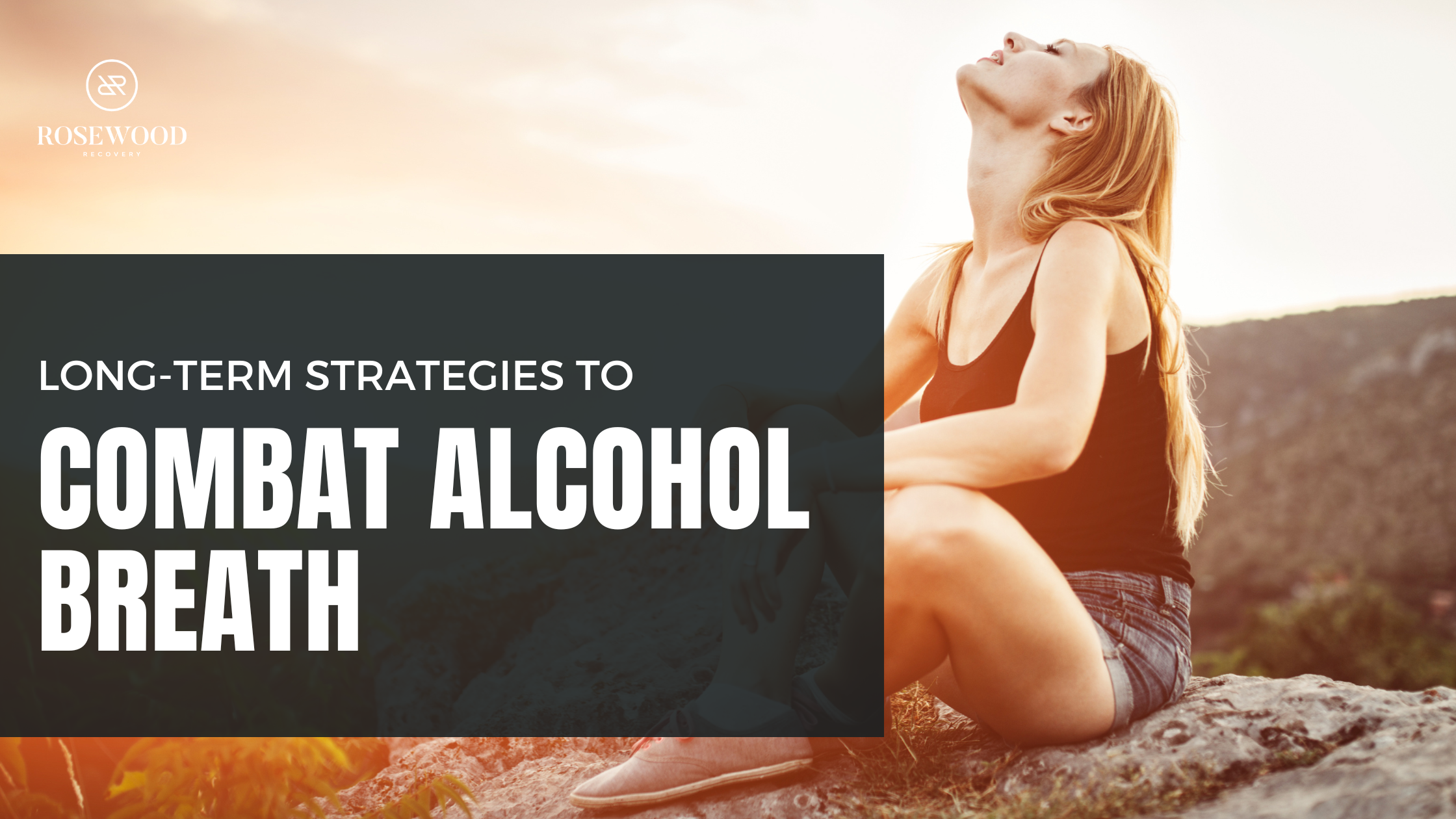Disclaimer: The material and information contained on this website is for educational purposes only.
How to Get Rid of Alcohol Breath: Tips and Tricks
Get rid of alcohol breath once and for all! Explore quick fixes, professional advice, and lifestyle tips to maintain fresh breath, ensuring you're always ready for any situation.
How to Get Rid of Alcohol Breath: Tips and Tricks

We've all been there — a night of revelry, celebration, or perhaps a casual drink with friends. But as the night winds down, the lingering odor of alcohol on your breath becomes a haunting reminder of the indulgence. Whether you're preparing for an important meeting, a romantic encounter, or simply wish to eliminate that telltale sign, learning how to get rid of alcohol breath is crucial.

Alcohol breath, medically known as "halitosis," arises from the breakdown of ethanol in the body, resulting in the release of volatile compounds through the breath. The unpleasant smell is caused by these compounds, such as acetaldehyde, which is created when the liver metabolizes alcohol.
In this article, we will delve into effective strategies and practical tips to help you combat alcohol breath, ensuring you can confidently face any situation with fresh and odor-free breath. From quick fixes to long-term solutions, we'll explore the most reliable methods that address the root causes of alcohol breath.
Understanding the Causes of Alcohol Breath

Metabolism of alcohol and production of volatile compounds
When we consume alcohol, our body metabolizes it primarily in the liver. This process involves breaking down ethanol, the main component of alcohol, into various byproducts. One of these byproducts is acetaldehyde, a highly volatile compound responsible for the distinct odor associated with alcohol breath.
Acetaldehyde is released into the bloodstream and eventually expelled through the breath, resulting in the noticeable breath odor.
Factors that contribute to the intensity and duration of alcohol breath
Several factors influence the intensity and duration of alcohol breath. These include:
- Alcohol consumption quantity: The more alcohol you consume, the higher the concentration of volatile compounds in your breath. This is particularly true for beverages with a higher alcohol content.
- Alcohol type: Different types of alcoholic beverages contain varying levels of congeners, which are byproducts produced during fermentation. Congeners contribute to the unique flavors and aromas of different drinks but can also intensify alcohol breath. Darker spirits, such as whiskey or red wine, tend to have higher congener content.
- Time elapsed since drinking: Alcohol breath is at its strongest shortly after consuming alcohol and gradually fades as the body metabolizes the alcohol. However, even after the effects of alcohol wear off, some residual odor may persist due to lingering compounds in the bloodstream.
- Individual metabolism: Each person's body metabolizes alcohol at a different rate. Factors such as age, weight, and overall health can affect how quickly your body processes alcohol and eliminates the associated breath odor.
Quick Fixes for Temporary Relief

- Breath mints, gum, and mouthwash
Breath mints, chewing gum, and mouthwash can provide temporary relief by masking the alcohol breath odor. These products work by temporarily freshening your breath and covering up the unpleasant smell. Look for sugar-free options to avoid contributing to dental issues.
- Masking techniques and home remedies
Some natural remedies and masking techniques can help alleviate alcohol breath temporarily. Chewing on fresh herbs like parsley or mint leaves can provide a natural and refreshing scent to counteract the alcohol odor. Additionally, citrus fruits, such as lemon or lime, can help neutralize the smell.
- Temporary odor-neutralizing sprays
Odor-neutralizing sprays specifically designed for breath freshness can be used to temporarily eliminate alcohol breath odor. These sprays contain ingredients that neutralize odorous compounds and provide a quick burst of freshness.
Remember, while these quick fixes offer temporary relief, they do not address the underlying causes of alcohol breath. For a more long-term solution, it's essential to adopt proper oral hygiene practices and consider lifestyle adjustments, which will be discussed in later sections.
Long-Term Strategies to Combat Alcohol Breath

While quick fixes provide temporary relief, adopting long-term strategies is crucial to effectively combat alcohol breath. By addressing the underlying causes and making lifestyle adjustments, you can achieve fresher breath even after consuming alcohol.
Proper oral hygiene practices
- Regular brushing and flossing: Brushing your teeth at least twice a day and flossing daily helps remove food particles and plaque that can contribute to bad breath. Pay attention to brushing your tongue as well, as it harbors bacteria and can contribute to odor. Use a soft-bristled toothbrush and fluoride toothpaste for optimal oral hygiene.
- Tongue scraping or brushing: Using a tongue scraper or brushing your tongue with a toothbrush can significantly reduce odor-causing bacteria on the surface of the tongue. Gently scrape or brush from the back of the tongue to the front, rinsing the scraper or brush in between.
- Mouthwash with antibacterial properties: Incorporate an antibacterial mouthwash into your oral hygiene routine. Look for mouthwashes that contain ingredients like chlorine dioxide or cetylpyridinium chloride, which can help kill bacteria and freshen breath.
Hydration and saliva stimulation
- Drinking water and staying hydrated: Alcohol consumption can lead to dehydration, contributing to dry mouth and exacerbating breath odor. Stay hydrated by drinking plenty of water before, during, and after consuming alcohol. Adequate hydration promotes saliva production, which helps wash away bacteria and neutralize odor-causing compounds.
- Chewing sugar-free gum: Chewing sugar-free gum stimulates saliva flow and helps keep your mouth moist. Saliva plays a crucial role in neutralizing acids and bacteria, reducing the chances of developing bad breath.
Dietary considerations
- Foods that help reduce alcohol breath: Some foods can naturally help combat alcohol breath. Include foods like fresh fruits, vegetables, and herbs in your diet, as they contain natural enzymes and antioxidants that can neutralize odor-causing compounds.
- Foods and beverages to avoid: Certain foods and beverages can contribute to bad breath, especially when combined with alcohol. Avoid consuming strong-smelling foods like garlic, onions, and spices before or during alcohol consumption, as they can intensify the breath odor. Additionally, minimize or avoid sugary and acidic drinks, as they can promote bacterial growth and contribute to bad breath.
Smoking cessation and alcohol moderation
- The impact of smoking on breath odor: Smoking not only leads to its distinct odor but also contributes to bad breath. Tobacco products can cause dry mouth, gum disease, and increase the likelihood of developing oral infections, all of which contribute to breath odor. Quitting smoking can greatly improve overall oral health and freshen your breath.
- Managing alcohol consumption for fresher breath: Moderation is key when it comes to alcohol consumption. Drinking excessively can lead to stronger and longer-lasting alcohol breath. Pace your drinking, opt for lower-congener beverages, and consider alternating alcoholic drinks with water to reduce the impact on your breath.
By adopting these long-term strategies, you can address the root causes of alcohol breath and maintain fresher breath in the long run. Remember, maintaining good oral hygiene, staying hydrated, making mindful dietary choices, and moderating alcohol consumption can significantly improve your breath freshness even after enjoying a night out.
Professional Help and Expert Advice

- Consulting a dentist or oral health professional
If you're struggling with persistent alcohol breath or want personalized advice, consulting a dentist or oral health professional is a wise step. These experts can evaluate your oral health, identify any underlying issues contributing to bad breath, and provide tailored recommendations.
- Breath analysis and specialized treatments
In some cases, a professional breath analysis can provide valuable insights into the specific causes of your alcohol breath. Breath clinics or specialized dental offices can perform detailed assessments to pinpoint the compounds contributing to the odor. Based on the analysis, they may recommend targeted treatments, such as professional cleaning, antimicrobial rinses, or specialized oral care products.
- Other medical conditions that may contribute to chronic bad breath
Chronic bad breath can be a symptom of underlying medical conditions unrelated to alcohol consumption. Certain health issues like gastrointestinal disorders, respiratory infections, or dry mouth syndrome can contribute to persistent breath odor. If your alcohol breath persists despite implementing oral hygiene practices, it's important to consult a healthcare professional to rule out any underlying medical conditions.
Lifestyle Tips for Maintaining Fresh Breath

- Being mindful of alcohol choices
Choosing alcoholic beverages with lower congener content can help minimize the intensity of alcohol breath. Opt for clear spirits like vodka or gin, which tend to have fewer congeners compared to darker spirits or wines.
- Practicing moderation and responsible drinking
Practicing moderation when consuming alcohol not only promotes overall health but also reduces the likelihood of strong alcohol breath. Set limits for yourself and avoid excessive drinking, allowing your body enough time to metabolize the alcohol and minimize its impact on your breath.
- Overall oral health practices to promote fresh breath
Incorporate healthy oral hygiene habits into your daily routine. Brush your teeth at least twice a day, floss regularly, and clean your tongue to remove bacteria and food particles. Additionally, visit your dentist for routine check-ups and professional cleanings to maintain optimal oral health.
FAQs
How long does alcohol breath last?
The length of time that alcohol breath lasts can vary depending on how much alcohol you've consumed and how quickly your body metabolizes it. Typically, the smell of alcohol on your breath can last for several hours after you've stopped drinking. However, the best way to get rid of alcohol breath is to wait until the alcohol has been completely metabolized by your body.
Can I use mouthwash instead of brushing my teeth?
While mouthwash can be a quick fix for bad breath, it's not a substitute for brushing your teeth. Brushing your teeth helps remove food particles and bacteria from your mouth, while mouthwash only masks the smell temporarily. Additionally, some mouthwashes contain alcohol, which can actually worsen bad breath by drying out your mouth.
Can I just chew gum or suck on mints to get rid of alcohol breath?
Chewing gum or sucking on mints can help mask the smell of alcohol on your breath temporarily. However, these methods don't actually get rid of the odor; they only cover it up. To effectively get rid of alcohol breath, you should brush your teeth and tongue, drink plenty of water, and eat something high in protein.
What foods should I avoid if I have alcohol breath?
Foods that are high in sugar or strong-smelling can contribute to bad breath and make the smell of alcohol on your breath worse. Avoid foods like garlic and onions that have a strong odor, as well as sugary foods like candy and soda. Instead, choose foods that are high in protein like cheese or nuts.
Is there anything else I can do to prevent alcohol breath?
One way to prevent alcohol breath is to drink in moderation or avoid drinking altogether. Additionally, staying hydrated by drinking plenty of water can help reduce the odor of alcohol on your breath. Finally, practicing good oral hygiene by brushing and flossing regularly can help prevent bad breath caused by bacteria in your mouth.
Summary
In this article, we explored various strategies to effectively combat alcohol breath. From understanding its causes to implementing quick fixes, long-term solutions, and seeking professional advice, we covered a range of approaches to tackle this common concern.
We encourage you to implement these techniques and strategies in your daily life to achieve fresher breath and enhanced confidence, even after consuming alcohol. By adopting good oral hygiene practices, making mindful alcohol choices, seeking professional guidance when needed, and maintaining overall health, you can bid farewell to alcohol breath.
Remember, fresh breath is not only a matter of social etiquette but also an indicator of good oral and overall health. By prioritizing proper oral hygiene, seeking professional care, and making conscious lifestyle choices, you not only combat alcohol breath but also promote a healthy and confident self.
Related Articles
If you're in need of substance abuse treatment, reach out to our team today. We're always here to help.

